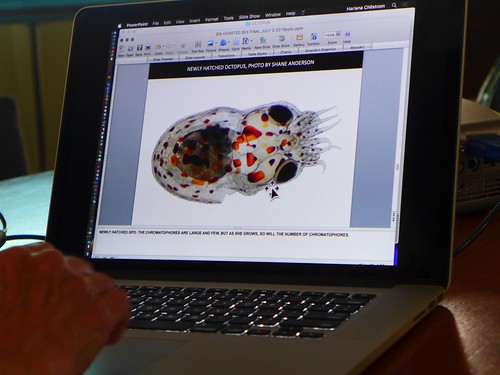Some of our heavyweights turned out for a science talk on octopus sex this morning, July 4th, as is our freedom.
The octopus favors deeper waters, say two hundred feet on average, or at least that's true of the species we're looking at. They occupy all levels actually, including the shallows. These creatures contain venom as a defense. Sometimes the little guys are the most deadly.
We use the term mantle to refer to the gut sack, connected to one side of the head. The octopus has multiple hearts, one associated with each gill funnel (mantle openings, or intake valves), and one more centrally located. Two octopus ("octopi" is wrong) equals three plus three hearts, hence the title for this talk.
One exhaust port takes care of everything going out, including deoxygenated water. There's a mouth of course, lips around a beak right at the center of the radiating arms.
The arms are called hectocotles (with ligula at the ends) and one of gets involved in reproduction, when a male pulls a spermataphor from its own funnel and places it through a gill opening into an ovaduct. Arms are not tentacles. The octopus has no tentacles, technically.
Each spermataphor contains billions of sperm cells.
The oviducal gland nurtures the sperm for maybe six months or more. A given octopus may have been fertilized through both gills meaning both sperm incubators might be active.
Hariana Chilstrom is our presenter. She worked for many years with the Seattle Aquarium. She knows many of the creatures in her pictures by name.
In our discussion list she wrote:
Although there are thousands of invertebrates with crazy, sexy lives that live largely unnoticed by most people, octopus are animals that most folks recognize. But there’s a lot of misinformation about them, much of it involving anatomical inaccuracies that affect descriptions of the mating process. “Six-Hearted Sex,” is based on first hand observations, studies with a cephalopod expert for ten years, and research from primary sources.Potential mates sniff each other out for a protracted period. They're discriminating and in the wild have a choice of several partners. They don't always get along. Sometimes they run away from each other. Sometimes cannibalism occurs.
If they do mate, the process may last for some hours (say four). Some researchers theorize the male ligula may even scoop out sperms injected by a previous male. That's speculation however is a pattern seen elsewhere in Universe.
Placing the eggs in clusters and guarding them until they hatch (if all goes as planned).
Males tend to go crazy or lose their will to live or whatever in older age, becoming fish food in open waters, especially for sea lions in the Pudget Sound area. The females tend to die in their caves.
The octopus has a reputation for being very intelligent. They have big eyes and a large visual cortex. It's believed their vision is monochrome, but high resolution. They've been known to blow bubbles and chase them, indicative of playfulness.


